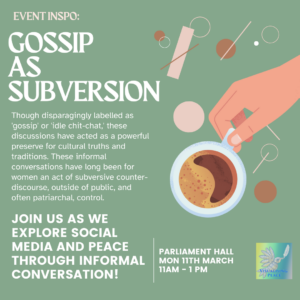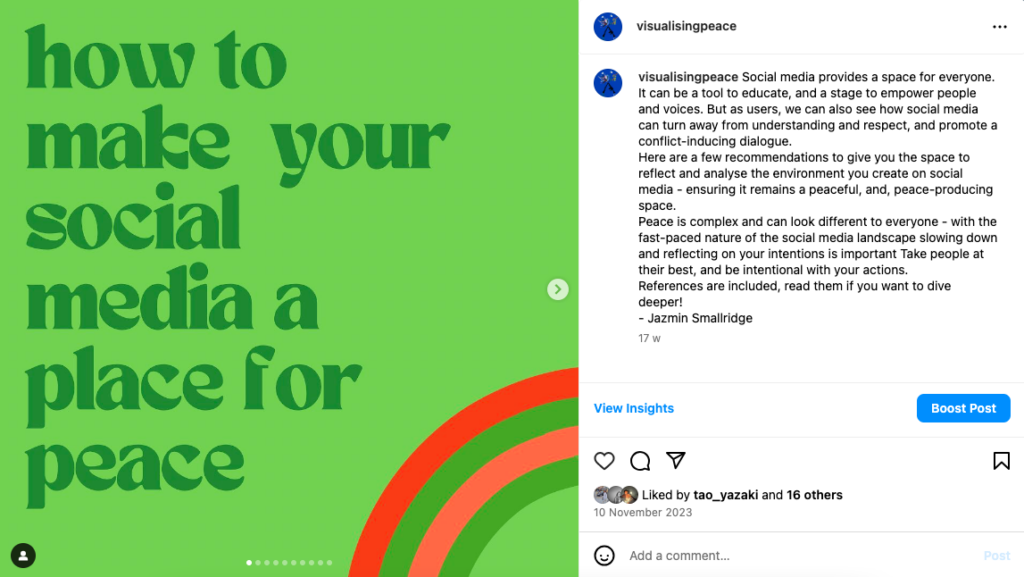Dialogue is at the heart of peacebuilding. Adversarial styles of debate, in person and online, are driving conflict.

These two truths have got us interested in exploring different approaches to discussion and debate, and the role that they can play in bringing people together or creating divides. Of course, this connects closely to our overarching interest in the power of words, language and stories to shape how people think, feel and behave. Words are world-building, and we should be mindful of this as we discuss and debate different opinions and perspectives.
All around the world, we are seeing threats to freedom of speech. People can feel censored (or pressured into self-censoring) within their own communities, in educational settings, and in the workplace. Many also experience oppression from governments, who restrict protest, self-expression and open, free discussion of contentious issues. When voices are suppressed, individuals and groups can become marginalised and vulnerable to harm, while power increasingly resides with dominant elites. Where debate is possible, it can be weaponised by politicians, the media and digital communications platforms to polarise communities and embed division. Inflammatory language, exaggeration and misinformation, ad hominem attacks, othering of ‘out-groups’, and echo-chamber algorithms (to name just a few contemporary challenges) increasingly condition us into habits of discussion that undermine peace.

As Alice König outlines in this interview, if we are to succeed at keeping and building peace, we need to hone very different habits of interaction. Sustainable peacebuilding processes (whether at home, in school, in local communities, or between states or armed groups) require diplomacy, mediation, active listening, the careful use of language, inclusion of diverse voices, slow thinking, iterative dialogue, sense-checking, fact-finding, learning journeys, the acknowledgement of wrongs, expressions of sorrow and regret, and – above all – a willingness to find common ground and shared purpose, despite differences and historic injustices. We see this style of debate modelled all too rarely in public spaces and in the online world.
As part of our research into the relationship between habits of debate and approaches to peacebuilding, members of our team – Tao Yazaki, Zoe Gudino, Finlay Whitton, Anna Pilgrim, Jazmin Smallridge, and Tabitha Stuart – have been engaging with the Young Academy of Scotland’s Charter for Responsible Debate. As the authors of the Charter explain in their report, they are interested in what it might take to shift the prevailing culture of debate away from competitive, combative models, to a more collaborative endeavour: ‘By framing our project not as a negotiation between individual stakeholders but as a challenge to collective action within a group of people who have shared aspirations, we have sought to prototype the kinds of debate we are simultaneously trying to better understand.’
Taking this as our cue, we have been experimenting with a range of debate formats to ask questions about the role that social media can play in peacebuilding. Over March 2024, our team explored three very different styles of debate via the following events:
- March 7th: a formal debate, with four panel speakers, in collaboration with the University of St Andrews’ Union Debating Society and UNA (United Nations Association), discussing the motion ‘This house opposes the use of social media for peacebuilding’ (Parliament Hall, 7.30pm).
- March 11th: a ‘chatty Wednesdays’ format, designed to bring together people from different walks of life in informal conversation about the role that social media can play in peacebuilding (Parliament Hall, 11-1pm, with free coffee/tea/cake!) – you can read a write-up here.
- March 22nd: an experiment in collaborative debate, led by our student team, with some ‘toolkit training’ and guided mindfulness, ahead of a solutions-focused set of group conversations designed not only to find common ground on the topic (how social media can be deployed for peace) but also to produce concrete, collectively worked-out proposals to move beyond simple agreement into action and implementation (Parliament Hall, 12-2pm, with free lunch!).

We had two goals in trying out these three different formats of debate: we wanted to give participants the opportunity to discuss the use of social media for peacebuilding in a range of contexts, and we also wanted to examine the dynamics of different models of debate, mindful of their potential for driving conflict as well as promoting dialogue. In debating the role of social media (itself a platform for debate), we hope to get more people thinking about connections between how we discuss contentious issues and how we visualise and build peace in the wider world.
As part of our background research into civil discourse, different methods of debate and their effectiveness in peacebuilding, team members have published a range of reflections and museum entries. You can explore some of them below:
- Intergroup Contact Theory, Harris Siderfin
- Polarisation in Canada, Madighan Ryan
- Cambridge Union Debate on Northern Ireland, Harris Siderfin
- Constructive Climate Communication, Madighan Ryan
- Civil Resistance and Peacebuilding, Madighan Ryan
We also have lots of further reading on the topic in our Visualising Peace Library. And team member Jazmin Smallridge has posted some suggestions via instagram:

